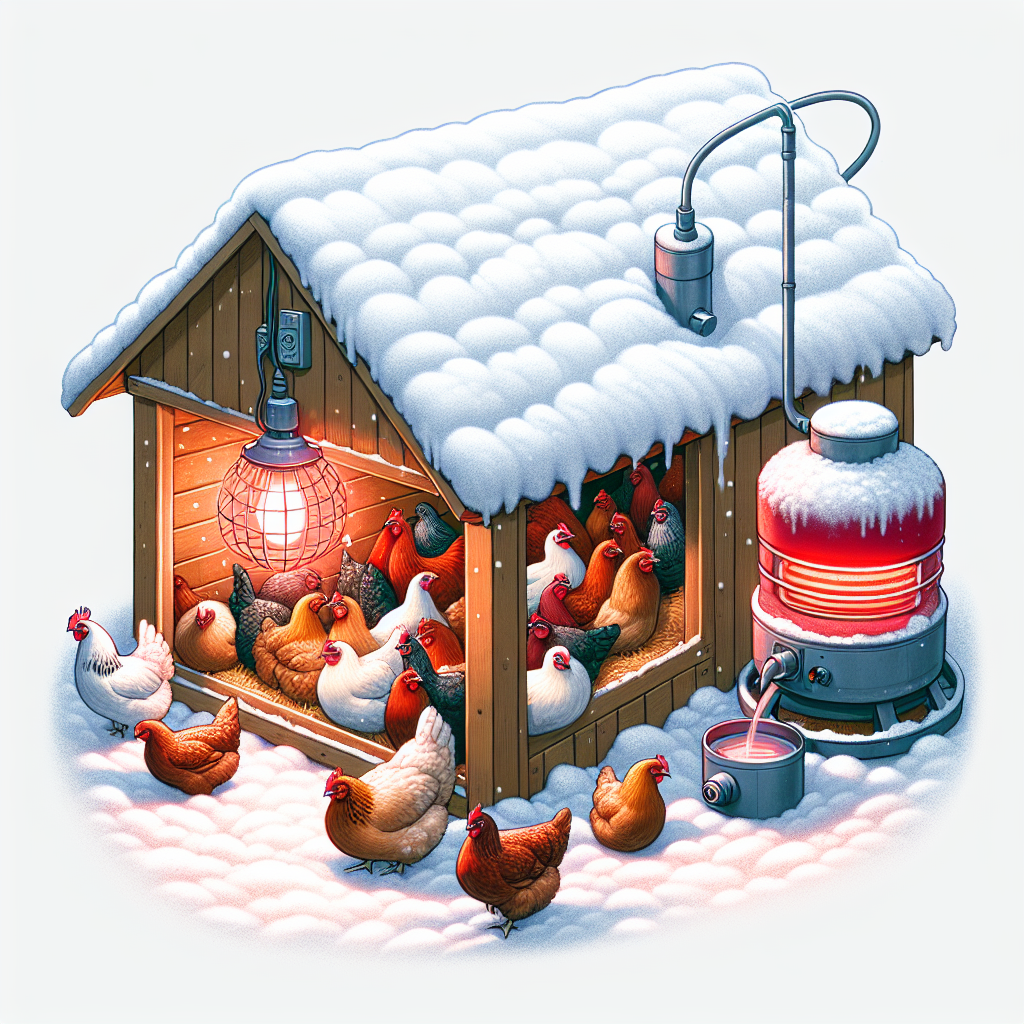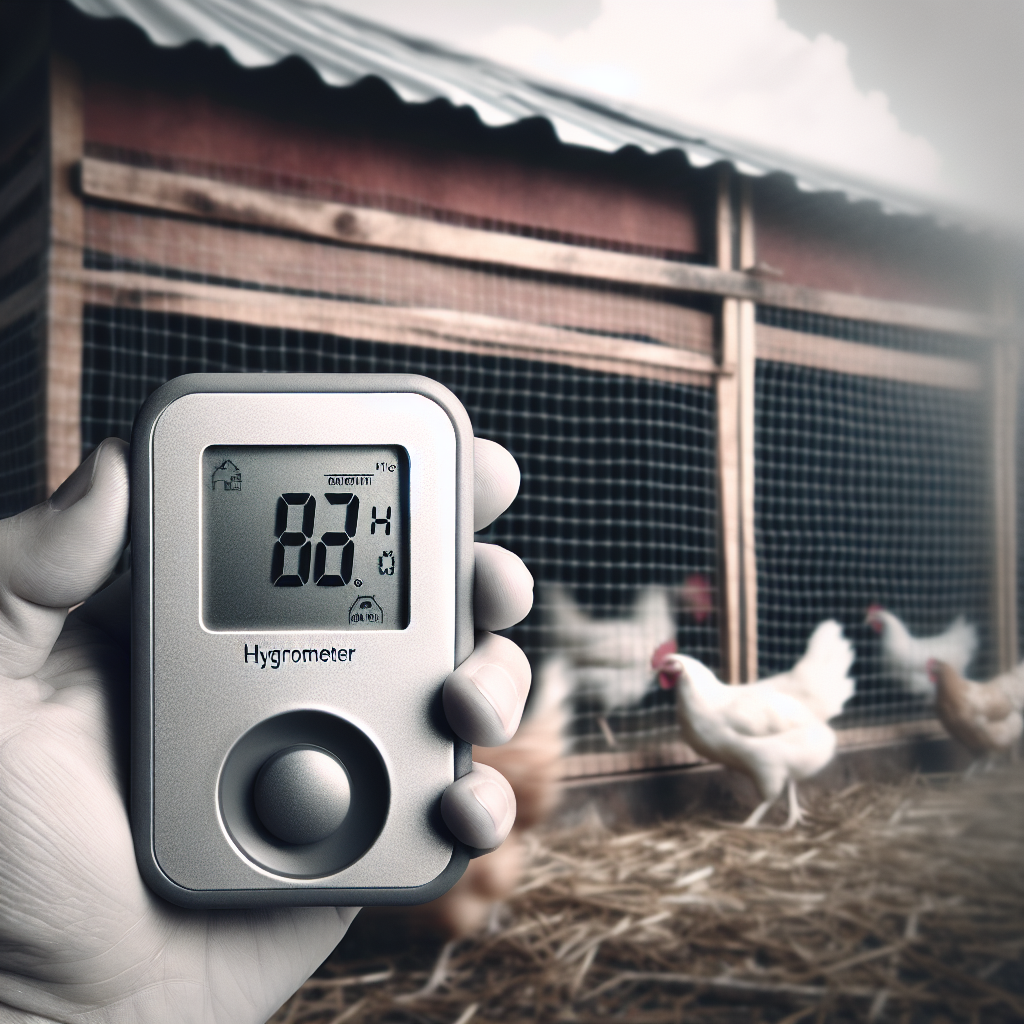Winter can be a challenging time for our feathery friends, as the cold weather often makes them less inclined to venture outside and engage in their usual activities. However, it’s essential to keep our chickens active and encouraged to exercise even during the winter months. By providing them with exciting and stimulating experiences, such as creating an outdoor play area, introducing entertaining toys, and offering engaging food puzzles, we can ensure that our clucky companions stay healthy and happy all year round. So, let’s explore some innovative ways to keep our chickens active during winter, ensuring they have the best possible quality of life.
Providing Shelter
Insulating the coop
To ensure the comfort and well-being of your flock during the winter months, it’s essential to insulate their coop. Insulation helps regulate the temperature inside the coop, keeping it warm in cold weather and cool in hot weather. Use materials like straw, wood shavings, or even old blankets to line the walls and floor. Be sure to seal any gaps or cracks to prevent drafts from entering the coop. By providing a cozy and insulated environment, you’ll encourage your chickens to stay active and engaged even during the winter.
Roosting bars
Roosting bars are an essential feature in any chicken coop. These elevated perches mimic the natural roosting behavior of chickens, allowing them to rest and sleep comfortably. During the winter, it’s crucial to have roosting bars that are wide enough for the chickens to flatten their feet and cover them with their feathers. This position helps them maintain body heat, keeping their legs warm. Make sure the roosting bars are positioned at a reasonable height to avoid any potential injuries from jumping down.
Ventilation
While it may seem counterintuitive, proper ventilation is crucial for a healthy and comfortable chicken coop, even in the winter. Good ventilation helps remove excess moisture and harmful gases, such as ammonia, which can build up in the coop. It also prevents the accumulation of stale air, which can lead to respiratory and other health issues. By ensuring an adequately ventilated coop, you create a fresh, clean environment for your chickens, promoting their overall health and well-being.
Lighting
During the winter months, when daylight is shorter, providing adequate lighting in the chicken coop is essential. Poor lighting can cause stress and disrupt your chickens’ natural behavior, affecting their overall health and productivity. Install artificial lighting that mimics natural daylight to ensure your flock receives at least 14 hours of light each day. This extended light exposure helps maintain egg production and keeps your chickens active and engaged throughout the winter season.
Creating an Enriched Environment
Obstacle course
An obstacle course is a fun and engaging way to encourage your chickens to stay active and exercise, even during the winter. Create a simple course using ramps, low hurdles, and tunnels that allow your chickens to jump and explore. This not only keeps them physically active but also stimulates their natural curiosity and problem-solving abilities. Be sure to set up the obstacle course within the coop or a protected outdoor area, taking into consideration the weather conditions.
Treat dispensers
Treat dispensers are an excellent way to provide mental stimulation and encourage physical activity in your chickens. These devices hold treats that chickens must peck or roll to release, requiring them to use their beaks and feet to obtain their rewards. Invest in treat dispensers specifically designed for chickens or create DIY versions using recycled materials. Fill them with healthy treats such as mealworms or seeds to make the experience even more rewarding for your flock.
Foraging toys
Foraging is a natural behavior for chickens, and providing foraging toys in the winter can keep them active and engaged. Scatter treats or grains in the straw or shavings bedding, encouraging your chickens to scratch and search for their food. Consider using treat balls or hanging feeders that dispense small amounts of food when pecked or moved. These toys not only promote physical activity but also allow your chickens to exhibit their natural behavior of searching for food.
Mirrors
Chickens are highly sociable animals and enjoy the company of their flockmates. During the winter when outdoor space may be limited, mirrors can provide a sense of companionship and entertainment for your chickens. Install small, shatterproof mirrors securely in the coop or outdoor run where your chickens can see their reflections. The sight of other chickens, even if it’s just their own reflections, can alleviate loneliness and promote activity and interaction within the flock.
Encouraging Natural Behaviors
Dust bathing area
Dust bathing is an essential behavior for chickens as it helps keep their feathers clean and free from parasites. Designate an area within the coop with loose dirt, sand, or a mixture of both for your chickens to engage in this natural behavior. Ensure that the dust bathing area is large enough for all your chickens to use simultaneously without overcrowding. Regularly replenish the dirt or sand to maintain a suitable depth for comfortable dust bathing. This activity not only keeps your chickens active but also contributes to their overall health and cleanliness.
Perches and branches
Providing perches and branches inside and outside the coop creates opportunities for your chickens to exercise their natural perching behavior. Install sturdy, varying height perches within the coop, allowing chickens to jump and navigate between them. Consider placing branches or logs of different thicknesses in the outdoor run, encouraging your chickens to balance and strengthen their leg muscles. These perching surfaces provide mental stimulation and physical exercise, promoting the well-being and health of your flock.
Grazing area
If you have the space, consider creating a designated grazing area for your chickens. This area could be a small fenced section of your yard where your chickens can safely forage for grass, weeds, and insects. By allowing them to engage in natural grazing behavior, you provide mental stimulation, exercise, and a diverse range of nutrients. Rotate the grazing area periodically to ensure fresh and nutritious vegetation, and always supervise your chickens to prevent them from venturing into unsafe areas or eating toxic plants.
Dirt or sand pit
In addition to using a designated dust bathing area, chickens also enjoy digging and scratching in loose dirt or sand. Provide a pit or tray filled with loose dirt or sand that is accessible to your chickens. This allows them to exercise their natural instincts and encourages physical activity. It’s important to regularly replenish the dirt or sand, as chickens can quickly dig it out and spread it around. A dirt or sand pit provides an engaging and enriching activity for your chickens, keeping them active and entertained during the winter months.
Offering Nutritious Food
Hydration
Proper hydration is crucial for your chickens’ overall health and well-being, regardless of the season. Ensure clean and fresh water is readily available to them at all times. During the winter months, water may freeze, so it’s important to regularly check and thaw any ice that may have formed. Consider investing in heated waterers or using heated bases to prevent freezing. Hydrated chickens are more active and energetic, so maintaining their water supply is essential in encouraging them to stay active and exercise.
Healthy treats
Treats are a great way to provide additional nutrition and encourage activity in your chickens. During the winter, when foraging opportunities may be limited, offering healthy treats can help keep your flock engaged. Choose treats that are high in protein and nutrients, such as mealworms or black soldier fly larvae. These treats not only provide physical stimulation but also contribute to your chickens’ overall health and immune function. Remember to offer treats in moderation to maintain a balanced diet for your flock.
Vegetables and herbs
Incorporating fresh vegetables and herbs into your chickens’ diet is not only a healthy option but also a way to engage their natural foraging behaviors. Introduce a variety of leafy greens, such as kale, spinach, or lettuce, into their regular feed. Hang bundles of herbs like mint, basil, or parsley in the coop or outdoor run, allowing your chickens to peck and nibble on them. These nutritious additions to their diet provide mental stimulation, promote foraging, and contribute to the overall health of your flock.
Maintaining a Regular Routine
Feeding schedule
Establishing a regular feeding schedule is essential in keeping your chickens active and maintaining their overall health. Feed your chickens at the same time each day to establish a routine they can rely on. Consistency in meal times helps keep your flock motivated and active, as they anticipate and look forward to their meals. Incorporate a variety of feeds, including grains, pellets, or crumbles, to provide a balanced diet and keep your chickens interested in their food.
Watering routine
As with feeding, maintaining a regular watering routine is vital for your chickens’ well-being and encourages their activity. Provide fresh water in clean containers, and check them multiple times a day to ensure a continuous supply. During the winter, water can freeze quickly, so make it a habit to check and thaw any ice that forms. By establishing a watering routine, you not only ensure hydration but also an active and energized flock.
Opening and closing the coop
Opening and closing the coop at consistent times each day not only helps regulate your chickens’ routine but also ensures their safety. Chickens rely on natural light to regulate their internal clocks, so opening the coop at dawn allows them to wake naturally. Closing the coop at dusk protects them from predators and provides a secure sleeping environment. By adhering to a regular schedule, you provide stability for your flock and promote their activity and well-being.
Promoting Socialization
Introducing new chickens
Adding new members to your flock is an excellent way to encourage socialization and activity. Introduce new chickens gradually, allowing them to get to know each other through a wire barrier before direct contact. Over time, they will become acquainted and form social bonds, engaging in activities together. Monitor their interactions and ensure there is enough space and resources for all the chickens. By promoting socialization, you create an environment that encourages activity, curiosity, and healthy relationships within your flock.
Playtime with humans
Interacting with your chickens directly is a great way to keep them active and entertained. Spend time with your flock, gently handling and holding them to build trust and familiarity. Engage in activities like gently tossing treats for them to catch or playing simple games. Your presence and involvement not only encourage physical movement but also stimulate your chickens’ natural curiosity and sociability. Regular playtime with humans strengthens the bond between you and your chickens, creating a positive environment for their well-being.
Supervised interactions with pets
If you have other pets, such as dogs or cats, it’s important to supervise their interactions with your chickens. Gradually introduce your chickens to your pets, ensuring they are comfortable and safe. These supervised interactions provide mental stimulation for both your chickens and pets and allow them to engage in natural behaviors. However, always prioritize the safety of your chickens and supervise closely to prevent any harm or stress.
Providing Entertainment
Chick TV
Installing a small window or clear panel in the coop can provide chickens with visual entertainment. They will be able to observe the world outside, watching birds, squirrels, or other animals. This form of “Chick TV” keeps them mentally engaged and stimulated, promoting curiosity and activity. Ensure the window or clear panel is securely fastened and made of a material that can withstand pecking and scratching.
Radio or music
Playing gentle music or having a radio playing in the coop can have a soothing and calming effect on your chickens. The sound of music can alleviate stress and create a peaceful ambiance. Choose soft and calming genres like classical or instrumental music, avoiding any loud or abrupt sounds that may startle or stress your flock. The gentle background music provides a stimulating environment that encourages activity and relaxation.
Outdoor adventures
When weather conditions permit, allow your chickens to venture outdoors for supervised adventures. They will enjoy exploring new areas, scratching for food, and engaging in natural behaviors. Choose safe and enclosed outdoor spaces that are predator-proof, ensuring a secure environment for your flock. Vitamin D from sunlight will also aid in their overall health and well-being. Providing outdoor adventures promotes physical activity, mental stimulation, and a closer connection to nature.
Keeping Warm and Dry
Dry bedding
Maintaining dry bedding in the coop is crucial for your chickens’ comfort and overall health. Wet or soiled bedding can lead to respiratory issues and infections. Regularly clean out soiled bedding and replace it with fresh, dry material like straw or wood shavings. Ensure the coop is well-ventilated to allow moisture to escape, preventing the buildup of mold or mildew. By providing dry and clean bedding, you create a cozy and comfortable environment that encourages activity and exercise.
Snow-free area
Clearing a snow-free area within the coop or outdoor run provides a space for your chickens to move freely without discomfort. Snow can be cold and wet, making it unpleasant for chickens to walk on. Shovel or sweep away snow regularly to maintain a clear path and prevent potential injuries or frostbite. This snow-free area allows your chickens to exercise, scratch, and explore without hindrance, promoting their overall activity and comfort during winter.
Heat source
In extremely cold climates, providing a supplemental heat source can help keep your chickens warm and active. Choose a safe heating option specifically designed for chicken coops, such as a heat lamp or radiant heater. Position the heat source away from bedding and other flammable materials, ensuring it is secured and cannot be knocked over or damaged. Monitor the temperature closely to maintain a comfortable and safe environment for your flock.
Monitoring Health and Safety
Regular health check-ups
Regularly checking your chickens’ health is essential in identifying any potential issues early on. Inspect their feathers, skin, eyes, beak, and comb for signs of parasites, injuries, or abnormalities. Examine their droppings for consistency and color, as changes may indicate health problems. Monitor their overall behavior and energy levels to detect any signs of illness or distress. By conducting regular health check-ups, you can address any concerns promptly and ensure the well-being of your flock.
Protecting against predators
Predators pose a significant threat to the safety and well-being of your chickens. Take measures to protect your flock by securing the coop with sturdy fencing, including burying it underground to prevent digging. Install predator-proof locks on coop doors and windows, and ensure that any openings are covered with strong wire mesh. Regularly check and reinforce fencing and secure any potential entry points. By implementing these predator-proof measures, you create a safe environment that allows your chickens to move freely and exercise without fear.
Preventing boredom and aggression
Boredom and aggression can arise within a flock if they do not have enough mental and physical stimulation. Ensure your chickens have enough space within the coop and outdoor run to move, flap their wings, and engage in natural behaviors. Incorporate enriching activities such as toys, perches, and foraging opportunities to prevent boredom. If aggression is an issue, provide separate areas or dividers within the coop where chickens can retreat or establish their territories. Address any aggressive behavior promptly to foster a peaceful and active flock.
Seeking Veterinary Advice
Consulting a poultry veterinarian
If you have any concerns or questions about your chickens’ health or well-being, it’s important to seek advice from a poultry veterinarian. Poultry veterinarians specialize in chicken care and can provide valuable guidance on nutrition, disease prevention, and other health-related topics. They can conduct thorough examinations, diagnose any illnesses or injuries, and recommend the appropriate treatments. Regular consultations with a poultry veterinarian ensure the proactive and comprehensive care of your flock.
Vaccinations and deworming
Vaccinations and deworming are fundamental aspects of maintaining a healthy flock. Consult with a poultry veterinarian to determine the vaccinations necessary to protect your chickens against common diseases. Regular deworming treatments help prevent internal parasites, improving overall health and reducing the risk of infection. Follow the recommended vaccination and deworming schedules provided by your veterinarian to ensure your flock remains healthy and active during the winter and all year round.
Treating any illnesses or injuries
If your chickens become ill or sustain injuries, it’s vital to seek veterinary advice promptly. Poultry veterinarians can assess the condition and provide appropriate treatment options. This may include administering medications, providing wound care, or performing necessary surgical procedures. Prompt and proper treatment ensures the comfort, health, and well-being of your flock, allowing them to recover and resume their normal activities. Regular veterinary care is crucial in maintaining an active and thriving flock.
In conclusion, encouraging your chickens to stay active and exercise during winter requires attention to their shelter, environment, natural behaviors, diet, routine, socialization, entertainment, warmth, and safety. By providing a comfortable and insulated coop, along with roosting bars and adequate ventilation, you create an environment conducive to activity. Creating an enriched environment with obstacle courses, toys, and mirrors stimulates mental and physical engagement. Encouraging natural behaviors through dust bathing areas, perches, grazing, and dirt pits reinforces their innate instincts. Offering nutritious food, maintaining routines for feeding and watering, and promoting socialization with new chickens, humans, and supervised pets all contribute to an active lifestyle. Providing entertainment, such as “Chick TV,” music, and outdoor adventures, keeps them mentally stimulated. Ensuring a warm and dry coop, monitoring health and safety, and seeking veterinary advice when needed safeguards their well-being. By implementing these comprehensive strategies, you can ensure your chickens remain active, healthy, and happy throughout the winter months.




